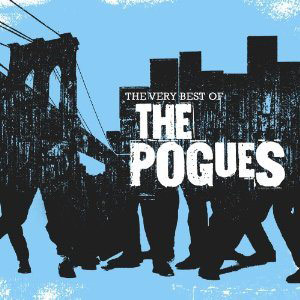
The Very Best of The Pogues
Shout! Factory
For more than two decades, The Pogues celebrated their Irish heritage with rousing versions of traditional songs as well as originals every bit as classic. They proved that the unlikely bedfellows of punk and Celtic folk could coexist like stout and ale in a black and tan while creating a rich songbook seemingly inspired by the Homer Simpson maxim of alcohol being "the cause of, and solution to, all of life’s problems." That mush-mouthed singer Shane MacGowan became the living embodiment of the Irish stereotype did little to diminish the band’s output, even when absent from the group for two records.
Shout Factory’s recent compendium, The Very Best of The Pogues, attempts to encapsulate The Pogues’ career through 18 tracks (an apparent expansion of a 1991 best-of, which didn’t include any material from post-MacGowan albums Waiting for Herb and Pogue Mahone, but also not a reprise of the UK-only comp of the same name). While no single-disc compilation could hope to be all things to all fans, this album does provide a cohesive representation of The Pogues’ catalog.
The album leads off with “Dirty Old Town," an Ewan MacColl (father of Kirsty) cover from Rum, Sodomy & the Lash (1985), the band’s second album. With four songs derived from this record, Rum is represented more than any other studio album. It’s not surprising, as with cuts like "A Pair of Brown Eyes,” the band had begun to hits its stride. This was even more apparent on Poguetry in Motion, an EP that followed the next year. “The Body of an American” is a song that is at once celebratory and mournful, thus capturing the duplicity of life in less than five minutes.
As “Streams of Whiskey,” another Pogues classic, proves, Red Roses for Me, their first album, was not without its charms. But as most familiar with the band know, it was in the late ’80s that The Pogues hit their creative (and commercial) apex. They released third album If I Should Fall from Grave with God in 1988, and sealed their reputation as torchbearers for Irish music. “Fairytale of New York,” a duet with Kirsty MacColl became an international hit and subsequently an iconic Christmas song. Here, the record is also represented by the boisterous title track and the poignant “Thousands Are Sailing,” which shows MacGowan’s eloquence was never in short supply.
While subsequent albums never hit the benchmark set by If I Should Fall, The Pogues also never went belly up creatively. “Rain Street,” with its referencing of “Who Do You Love,” reveals even later records like Hell’s Ditch had their moments. Hell, “Tuesday Morning,” from Waiting for Herb (1993), is as good as anything else on the compilation. If one wanted to nitpick, it would have been nice to have the early singles included or some of the work featuring former member Cait O’Riordan more prominently. (I also don’t understand why it’s not in chronological order.) As it is, though, this record has everything an album titled The Very Best of The Pogues should.
Stephen Slaybaugh
PAST PERFECTS
Tony, Caro and John, Blue Clouds
Surf-Age Nuggets
Loop
Bert Jansch, Heartbreak
Athens, GA - Inside/Out
Royal Trux, Accelerator
Crime & The City Solution, An Introduction to... Crime & The City Solution/A History of Crime: Berlin 1987-1991
The Normals, So Bad So Sad
Spain, The Blue Moods of Spain, She Haunts My Dreams and I Believe
Archers of Loaf, All the Nations Airports and White Trash Heroes
Blur, Blur 21: The Box
Can, The Lost Tapes
Sugar
The English Beat, The Complete Beat
